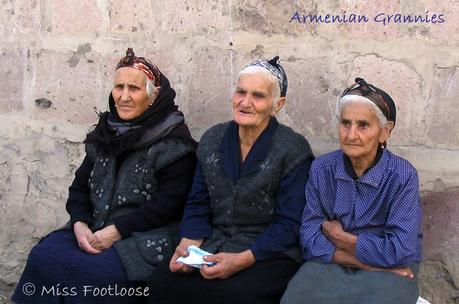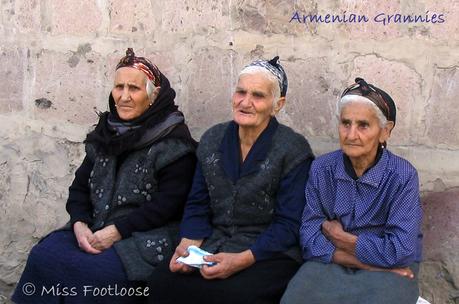Do you like to smile? Well, be serious for a moment!
I'm sure you know that if you're a globetrotter or an expat you invariably come across baffling habits or customs in foreign countries. And sometimes notions and ideas you've taken for granted as gospel truth in your own culture are suddenly brought into question. Like smiling. Smiling is nice, don't you agree? It's cheap. It's easy. People like it.
Well, no, sometimes they don't.


For six years I lived in the beautiful country of Armenia, tucked away in the Caucuses Mountains, and this is what I wrote at the time about the dangers of smiling:
I never thought much about the act of smiling - to smile or not to smile - I just sort of do it. It comes naturally, without contemplation. But here in Yerevan, the capital of Armenia, you'd better think about it. Smiling here is serious business. Just walk the streets and you'll see what I mean. What a grim, somber lot they are. People will look at you, scrutinize your clothes, but not make eye-contact. This is not because they don't like your coat, but because you are a stranger and probably a bad one (and actually, no, they don't like your coat). With 'stranger' I do not mean 'foreigner' only. I mean stranger as in unknown-person-not-belonging-to-my-clan.
As you live and learn in this country (expat confusion galore), you become familiar with certain signs that you are accepted, that you belong, that people like you. This is when they start tacking the word jahn onto your name when they address you. My Armenian friends call me Karen-jahn. Fortunately, I've been able to make some. And what's true about Armenians, once you've been accepted, you're a friend for life. They'll give you a kidney of you need one.
Should I take serotonin supplements?
In the last couple of years here in Armenia I have adapted my street behavior and do what the locals do, which mostly means you ignore everybody. I do not make eye contact when I step outside my gate. I do not smile. I'm turning into a somber person. I can feel my serotonin drying up by the minute. This is depressing. Is there no way out of this?
Expat confusion
What to do? I know as a guest in Armenia I should adapt and adjust, but really, should I sacrifice my precious serotonin? No!
So I make a decision:
From now on I am going to try and smile more at people, whether they like it or not. Just because everyone runs around with a gravedigger's face doesn't mean I have to do it. So there. I have a mission. I will change the atmosphere, show them how it's done, add kindness and friendliness to the ambiance. Good cheer and bonhomie will rush through the streets. Everybody will be happy.
I get my chance!
About a week after I make my new resolution I leave the house to buy eggs (dzoo) at the corner store. I go out the gate into the street and find that just to the right of our gate a woman is standing, waiting for something or somebody. A woman of post-menopausal sturdiness, she is very properly dressed, neat as a pin in a 1980's vintage suit. Every hair in place, shoes polished, handbag in her hand, scowling into space, ignoring me.
She's right there as I close the gate, impossible not to see, and I have to pass right by her to go to the shop to buy the dzoo.
I do not know her and I'm supposed to walk by her as if she's nothing but air. That's how it's done. However, I'm now on a quest to inject more smiles into the environment and I do what comes naturally: I smile at her to acknowledge her presence, her humanbeingness, her right to exist in the world.
"Barev dzez," I say nicely, looking right into her eyes for an instant as I tell her hello.
This happens:
She stares at me coldly, does not respond, and then, with a look of icy disdain, glances up to examine my hair, then down the length of my body to my (unpolished) shoes, then back up again. Without making eye contact, she turns her head sideways away from my face, pursing her lips in contempt and disapproval.
It is a magnificent display of rejection.
Fortunately . . .
I'm blessed with a huge ego coated with Teflon/Tefal. Were this not the case, I surely would have shriveled like a ripe grape in the sun under her withering gaze.
There's nothing to do but call up my sense of humor and continue my shopping errand. I leave behind the disapproving matron, smiling as I go. Smiling at nobody. So there.
Another opportunity!
We're going shopping. I open the gate so my man can drive out the car. I see a family walking down the street and about to pass our gate, so I hold up my hand to make my husband stop and wait in the driveway. There's a mom, a dad, and two small, cute kids. Making up the rear is what looks like grandma. The kids are happy, skipping and laughing and goofing off, as kids do. As they pass me, I look at them and then make eye contact with grandma. I smile at her, acknowledging my enjoyment of seeing her adorable grand kids, and of course, to simply be a friendly neighbor.
She gives me a death stare. I kid you not.
To smile or not to smile
"You have to be careful with men, Karen-jahn," my friend Ruzan tells me over lunch one day. "If a woman makes eye contact with a man and smiles, it means something." She gives me a meaningful look. Yes, I get it.
"If you smile at a woman you don't know, she will think you want to be her best friend, that you expect to be invited for coffee, be given things. Smiling means something here."
"Smiling means something in the West too," I say, feeling a little wounded. "It's a nicety, a recognition of the other person's existence, a way to just wish him or her well."
"Yes," Ruzan acknowledges, "but here, smiling is only for family and friends, for people you trust."
For people of your own clan. Armenians, I've learned, are very family-oriented. Families are extremely tight-knit and protective of their members. The world outside the immediate family circle is regarded with suspicion. This distrust probably has its roots in ancient tribal life (Mongols and Persians came raping and pillaging) as well as in the Soviet-era social climate (what if the neighbors told on you? What if they shipped you off to Siberia?) And now this distrust is also planted in contemporary life. Because why?
Because it's a jungle out there
In this new capitalist world you'd better protect what you have because somehow or other the other guy will screw you blind. So whatever few smiles you may have, baby, keep them for those nearest and dearest.
"How sad this is," I say. "Smiling is such a simple, nice thing. And it's good for you, you know. It raises your serotonin levels, it increases your endorphins. Where I come from it just makes everyone feel better."
Ruzan sighs. "I know that, Karen-jahn. I've been to America and I understand it. I like it now." She stares down in the mud in the bottom of her coffee cup. "But, you know, here, it's different."
I decide I'm just going to continue with my mission and keep smiling whenever I have an opportunity. And would you believe, in the years that follow we see a change for the better in the Armenian smiling deficit. I don't want to take credit for this all by myself, though, being a humble person. What happens is that life gets better in general. More foreigners come to Armenia bringing smiles, more diaspora Armenians from America and Europe come bringing smiles. So the locals begin to return your smile a little easier and more often - in hotels and restaurants and shops. However, in the street you're still smiling at your own risk. To smile or not to smile, you'd better think about it.
And don't you worry about me: I'm careful about smiling at men.
What surprised you when you visited or lived in another country? What fun, weird, or interesting habits or customs did you have to deal with or get used to? Don't be shy, tell me your tales.

